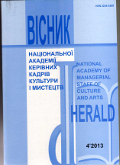The future develoment of Christianity in the postmodern epoch: based on the catholic philosophy
DOI:
https://doi.org/10.32461/2226-3209.4.2013.138030Keywords:
subject, grand narrative, universal values, human rights, existentional experienceAbstract
The position of modern catholic thinkers that protect traditional values and argue with postmodernists is revealed in the article. It is shown that the main attention of Christian philosophers and theologians is focused on the critics of postmodern deconstruction of the subject, relative values and senses and denial of grand narratives. It is demonstrated that postmodernism leads to moral relativism and makes unable not only traditional religion, but also a "secular religion" of human rights. Postmodernists criticize the "philosophia perrenis" thesis about the existence of inner self, hided from our sense organs. This inner self must be revealed and set free. According to postmodernism, such notions as subject, I, sense, universal value, absolute truth and others must be deconstructed as the atavism of metaphysical worldview. Postmodernists regard the process of self-forming to be absolute. The man himself as the subject is treated as impersonal stream of consciousness, mental continuum of thoughts, wishes, demands, and libido energies without semantic centre, hierarchy, the true or false interpretation. Instead of this the new image of chaotic rhizome is suggested. Rhizome has neither beginning, nor end, neither centre nor periphery. Postmodernists also reject the existence of a priori pure "I", the soul, the spirit as the immortal entity, the essence of the man. If there is no ideal selfness, then there is no the ideal of person, a moral and spiritual orienteer for achieving in one’s life. So if this thesis is true, then it is hard to speak about universal sense of life for mankind. In the postmodern situation no one knows what the true and proper way of life is. No one can be convinced that something is the only true value, norm or task in life. The one who knows (or pretends that he knows) would be regarded as the totalitarian manipulator, forcing others to accept his point of view and encroaching on the freedom. Even the words right, wrong, should are associated with the discrimination and limitation of the rights and freedoms. No life strategy can be true as there is no concept of truth in postmodern epoch. Everything is true, nothing is true. Every alternative is possible. And even some laws of logic (for example, law of excluded middle) formulated by Aristotle can be broken. According to catholic thinkers the main tendency today is the replacement of grand narrative "the sense of life" by the small narrative such as for example lifestyle, status, fashion. The contemporary man are interested more in "how to do something" than "what for", "is there any sense?". As the result the man as the subject is being vanished in some impersonal structures such as language, economics, sexuality, unconsciousness etc. These ideas also can menace not only the traditional religion such as Christianity, but also the conception of human rights and democracy. The conception of dignity of man is deeply connected with the religious faith in the immortal soul. So the rejection of spiritual immortality leads to rejection of man’s dignity. Both dignity and immortality are connected with the idea of transcendental God as the absolute super-person, ontological guarantee of sense, value, dignity, subjectivity and personhood. According to Christian dogma a man is created upon the image and likeness of God. So the moral task is to see behind the empirical face of neighbor the transcendental visage of God the creator and the possibility of eternal selfrealization and self-development in would-be life. If we reject this dimension, then we deny the dignity. If we say that "God is dead" then the metaphysical concept of the dignity is no more sustained and substantiated. Then we claim it useless and start to deal with the very empirical aspects of the man with all its disadvantages. Then we are helpless to establish some norm of humanity (humanness), nobleness, holiness, sinfulness. Then we can ask about the criteria, norms for estimating some events, facts. We conclude that nowadays in the epoch of postmodern the Nuremberg tribunal would be impossible to be hold. The verdict of tribunal about the crime against human now seems to be appealing to the grand narrative. If there is no human dignity, then there is no crime against this dignity. According to Graham Ward, the salvation of main worldview problem in the epoch of postmodern is based on specific anthropology that implies existential orientation and directivity toward God. When all scholastic arguments of God existence are not convincing, the only argument of religious man in his dialogue with atheist or agnostic is the existential experience. The Gospel’s commandment "Blessed are the poor for they shall inherit the earth" remains the fundamental ethical and epistemological truth of Christianity. So it gives hopes for the future prospects of Christianity despite of all theoretical conclusions that proclaim post-metaphysical and post-Christian era.Downloads
Published
Issue
Section
License
Authors who publish with this journal agree to the following terms:
1. Authors retain copyright and grant the journal right of first publication with the work simultaneously licensed under a Creative Commons Attribution License International CC-BY that allows others to share the work with an acknowledgement of the work's authorship and initial publication in this journal.
2. Authors are able to enter into separate, additional contractual arrangements for the non-exclusive distribution of the journal's published version of the work (e.g., post it to an institutional repository or publish it in a book), with an acknowledgement of its initial publication in this journal.
3. Authors are permitted and encouraged to post their work online (e.g., in institutional repositories or on their website) prior to and during the submission process, as it can lead to productive exchanges, as well as earlier and greater citation of published work (See The Effect of Open Access).


